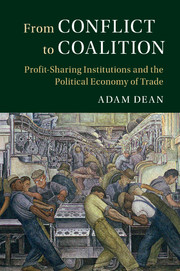Book contents
- Frontmatter
- Dedication
- Contents
- List of Figures
- List of Tables
- Acknowledgments
- 1 Introduction
- 2 A Theory of Profit-Sharing Institutions
- 3 Evidence and Research Design
- 4 The Gilded Wage: Trade Politics in the American Textile and Steel Industries
- 5 Liberalized by Labor
- 6 Trade Politics in Britain and Argentina
- 7 Power Over Profits
- 8 Conclusion
- References
- Index
- Miscellaneous Endmatter
1 - Introduction
Published online by Cambridge University Press: 05 September 2016
- Frontmatter
- Dedication
- Contents
- List of Figures
- List of Tables
- Acknowledgments
- 1 Introduction
- 2 A Theory of Profit-Sharing Institutions
- 3 Evidence and Research Design
- 4 The Gilded Wage: Trade Politics in the American Textile and Steel Industries
- 5 Liberalized by Labor
- 6 Trade Politics in Britain and Argentina
- 7 Power Over Profits
- 8 Conclusion
- References
- Index
- Miscellaneous Endmatter
Summary
On November 21, 1882, the American labor movement abandoned its unified support for high tariffs. The momentous decision came after Frank K. Foster, an early leader of the American Federation of Labor (AFL), gave a rousing speech at the Federation's annual convention in Cleveland, Ohio. According to Foster, high tariffs increased profits for employers in protected industries, but did nothing to increase workers’ wages. “‘Protection’ does not protect labor,” he explained, as “the rate of wages depends upon other causes than the tariff.” Foster went on to warn that employers used the benefits of “full protection” to form monopolies and crush labor unions. Trade protection, he told the convention, “only served to concentrate wealth in the hands of the few, to the disadvantage of the many.” Although many of the labor union leaders in attendance represented workers in tariff-protected industries, the Federation voted 17–1 to terminate its endorsement of trade protectionism. At the turn of the century, the AFL's Secretary-Treasurer looked back and explained, “we cannot afford to take a position on the tariff question, for our experience of the injury it wrought to the old Federation in 1882 is a sufficient lesson.”
Although the Federation ended its support for high tariffs, some American labor unions vehemently supported trade protection. For example, the steelworkers’ union frequently appeared before Congress alongside their employers, lobbying in favor of the tariffs that protected the steel industry from foreign imports. In fact, the iron and steel workers were incensed over the Federation's 1882 decision not to support high tariffs and formally withdrew from the organization in protest. As the union's President, John Jarrett, explained to the U.S. Senate in 1883, “Our organization is strongly a tariff organization, from the fact that we know that we do get better wages on account of the tariff.” However, the same Senate hearing also heard testimony from the textile workers’ union, which denied the benefits of high tariffs. According to the union, high tariffs protected capital in the product market, but left workers unprotected in the labor market, where competition from immigrant workers held down wages.
- Type
- Chapter
- Information
- From Conflict to CoalitionProfit-Sharing Institutions and the Political Economy of Trade, pp. 1 - 12Publisher: Cambridge University PressPrint publication year: 2016



